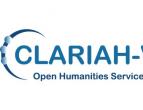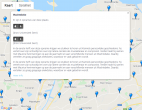GhentCDH supports four new infrastructure projects funded by the Flemish Research Council (FWO). Tools and services developed within CLARIAH-VL will be implemented in these projects. CLARIAH-VL focuses on boosting research in the Humanities and Social Sciences using digital tools and services. It unifies disciplines, which share the challenge of utilising a wide range of sources and heritage from ancient manuscripts to modern digital data. These projects align with the ambition to contribute to societal challenges such as environmental change, social inequality and cultural diversity from a humanities perspective. Interdisciplinary collaboration with, among others, climate scientists and ecologists is essential for achieving these goals. The four projects include:
Artemis. Advanced Research Tools for Environmental studies in an open Mapping Infrastructure for historical maps of the Scheldt valley. (supervisor: prof. dr. Christophe Verbruggen and prof. dr. Iason Jongepier, Antwerp University). Artemis aims to digitally enrich and make accessible historical maps with a focus on the Scheldt River Valley to explore its ecological history and landscape evolution. Using advanced techniques for feature extraction and toponym recognition, the project will facilitate research in ecology and historical geography, leveraging resources from major historical Belgian map collections. More about the Artemis project
Tools and services that will be used include: Idlab - data extraction pipeline for historical maps, Madoc, IIIF, Allmaps and Omeka S.
BelHisFirm: long-term firm-level data for the social sciences. (supervisor: prof. dr. Jan Annaert, Antwerp University). The projects extends an existing database with new, long-term data on various financial and non-financial aspects of Belgian companies for the 1873-2001 period and a complementary, tailor-made digital ecosystem to enrich, analyse and visualise this data. More about the BelHisFirm project.
Tools and services that will be used include: (tabular) data extraction pipeline, a collaborative data management platform, Madoc and nodegoat.
ANNHOPIS - a multilingual, multimodal, and machine learning-driven annotation infrastructure for the analysis, creation, enrichment and cross-cultural comparison of historical formulaic text corpora (supervisor: prof. dr. Klaas Bentein). Combining research expertise and machine-learning models into a single user-friendly research environment for text annotation allows searchers to maximally profit from each other’s expertise and technological advances, thus incentivizing innovative research approaches, and faster, more reliable, and more extensive annotation.
Tools and services that will be used include: research data modelling, standards based (W3C annotation model) collaborative, machine learning-driven text-annotation management platform
Parsed Corpus of Spoken Dutch Dialects + (GCND+) (supervisor: prof. dr. Anne Breitbarth) . Combining research expertise and machine-learning models into a single user-friendly research environment for text annotation allows searchers to maximally profit from each other’s expertise and technological advances, thus incentivizing innovative research approaches, and faster, more reliable, and more extensive annotation.
Tools and services that will be used include: IIIF for audio and transcriptions, a collaborative research data management platform.
For more information about our tools services, please contact Core Facility manager Joren Six



